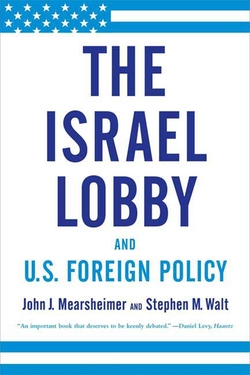When American citizens pressure their government in favor of Israel, some foreign policy mandarins snootily condemn this as privileging an ethnic group's narrow priorities over the disinterested formulation of foreign policy. But, in fact, lobbies like the American Israel Public Affairs Committee (AIPAC) and Christians United for Israel (CUFI) actually improve U.S. foreign policy.
 One of the worst bestsellers. |
In response, pro-Israeli activists typically justify their lobbying efforts on two grounds. (1) Utility: Israel benefits the United States. Americans profit from its developing and testing of advanced weaponry, its intelligence network, its cutting-edge water technology, and its being the strongest, most reliable state in the vital but wildly turbulent Middle East region. (2) Costlessness: U.S.-Israel relations do not interfere with other U.S. ties. In olden times, that meant relations with Egypt, Iraq, and Saudi Arabia; nowadays, it refers to Turkey, Qatar, and Iran.
These arguments, however, may not hold in the future, for utility and costlessness could disappear. As liberals distance themselves from the Jewish state, an eventual President Kamala Harris might reject what Israel has to offer and find that close relations with Jerusalem impede initiatives toward Iran.
Anticipating such a shift, I propose seeing the Israel lobby in an entirely different way, showcasing its domestic role versus foreign influence.
 The Blackstone Memorial, 1891: "Palestine for the Jews." |
Through the past century, those hinterlands have grown and roughly balanced each other. Both came into existence during World War I, when British Zionists pressured their government to support a Jewish national home in Palestine, as Arab leaders extracted promises from Britain about Palestine before helping its war effort. During World War II, Western Jews and their allies applied desperate pressure on the British government to open immigration to Palestine for Jewish refugees, as Arab rulers threatened to sabotage Britain's war efforts if it permitted that immigration.
After the war, American Zionists moved to the forefront, independent Arab states tripled in number. Zionists successfully lobbied President Truman to recognize the State of Israel in 1948, five Arab states invaded the nascent polity. Each side learned from the other: Israelis developed a powerful army, Arabs won increasing clout in Western politics, media, and education. Each side developed and refined techniques for extracting funds from its hinterland, whether the United Jewish Appeal or Saudi, Kuwaiti, and other government donations.
Repeatedly, when Israel's enemies attack, its American friends defend. Arab states boycotted U.S. firms invested in Israel; Israel's friends won legislation making complying with such boycotts illegal. Arab states withheld oil supplies; Zionists pushed against capitulation to such pressure. As Arab states rounded up overwhelming majorities in international organizations, Israel's friends did likewise in Congress. Each hinterland fights for its cause. Each provides diplomatic support, financial aid, and armaments.
 A sign of the 1973-74 times: the Arab oil embargo. |
In other words, American Zionists serve as a principal counterpart to anti-Zionist foreign states. The Zionists pressure Washington from within, the states do so from without. It's a significant difference but ultimately a technical one.
Thus, the Israel lobby does not impede the formulation of an objective foreign policy but constructively offsets anti-Israel influence. Arguing for Israel is not just protected under the First Amendment and entirely legitimate, but it informs and improves American policy formulation by countering foreign influences. The Israel lobby, therefore, is good for America.
Mr. Pipes (DanielPipes.org, @DanielPipes) is president of the Middle East Forum. He first drafted this article in 1981. © 2021 by Daniel Pipes. All rights reserved.
Jan. 28, 2021 update: And the Biden-era assault has started: David Corn of Mother Jones and Ken Dilanian of NBC News both published articles about Anne Neuberger, deputy national security adviser for cyber and emerging technology, and her family's foundation giving about $500,000 to AIPAC, with overtones of dual loyalty. For reactions, see the JNS coverage.
